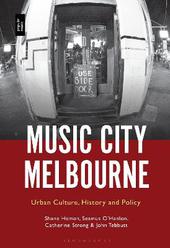
|
Music City Melbourne: Urban Culture, History and Policy
Hardback
Main Details
| Title |
Music City Melbourne: Urban Culture, History and Policy
|
| Authors and Contributors |
By (author) Prof Shane Homan
|
|
By (author) Professor or Dr. Seamus O'Hanlon
|
|
By (author) Dr Catherine Strong
|
|
By (author) Professor or Dr. John Tebbutt
|
| Physical Properties |
| Format:Hardback | | Pages:224 | | Dimensions(mm): Height 229,Width 152 |
|
| Category/Genre | Rock and Pop |
|---|
| ISBN/Barcode |
9781501365706
|
| Classifications | Dewey:781.64099451 |
|---|
| Audience | | Tertiary Education (US: College) | |
|---|
|
Publishing Details |
| Publisher |
Bloomsbury Publishing Plc
|
| Imprint |
Bloomsbury Academic USA
|
| Publication Date |
30 December 2021 |
| Publication Country |
United States
|
Description
How did Melbourne earn its place as one of the world's 'music cities'? Beginning with the arrival of rock 'n' roll in the 1950s, this book explores the development of different sectors of Melbourne's popular music ecosystem in parallel with broader population, urban planning and media industry changes in the city. The authors draw on interviews with Melbourne musicians, venue owners and policy-makers, documenting their ambitions and experiences across different periods, with accompanying spotlights on the gendered, multicultural and indigenous contexts of playing and recording in Melbourne. Focusing on pop and rock, this is the first book to provide an extensive historical lens of popular music within an urban cultural economy that in turn investigates the contemporary nature and challenges of urban music activities and policy.
Author Biography
Shane Homan is Associate Professor of Media Studies at Monash University, Australia. He has published five books, including Popular Music and Cultural Policy (co-editor, 2015). Seamus O'Hanlon is Associate Professor of History at Monash University, Australia. He has published five books, including City Life: The New Urban Australia (2018). Catherine Strong is Associate Professor in the Music Industry program at RMIT in Melbourne, Australia. Among her publications are Towards Gender Equality in the Music Industry: Education, Practice and Strategies for Change (co-editor, Bloomsbury 2019) and Death and the Rock Star (co-editor, 2015). John Tebbutt is Adjunct Associate Professor in the School of Media and Communication, RMIT University, Australia.
ReviewsMusic City Melbourne is one of the best books I've read in the growing field of urban music studies. More than just a celebration of Melbourne's well-known musical effervescence, Music City Melbourne offers meticulously-researched analyses of the role of public policy, media, social divisions, entrepreneurship and urban planning in the city's rich history of music-making. Written by leading experts in their fields, the book is academically rigorous and a pleasure to read. * Will Straw, Professor of Urban Media Studies, McGill University, Canada * Melbourne has been long touted as Australia's 'live music capital', and one of the world's most creative cities. How did this come to be? In their far-reaching exploration, Homan, O'Hanlon, Strong and Tebbutt dived into the archives, trawled old newspapers, delved into licensing and venue regulations and conducted interviews with musicians, booking agents, managers, fans and policy-makers, to reveal the hidden stories beneath the fabled 'music city'. It's a most welcome addition to the debate about creative cities, and model for how to examine musical histories in place. * Chris Gibson, Professor of Human Geography, University of Wollongong, Australia, and author of The Guitar: Tracing the Grain Back to the Tree * If you are interested in the music cities concept and related debates, then this case study of the place of pop and rock in Melbourne, Australia will be a must-read. Delving into the pleasures and pressures of urban music activities, industries and policies, the authors guide the reader through the city's 'popular music ecosystem' from the 1950s onwards. Though not intended as a definitive account of Melbourne's music, the analysis - punctuated as it is with the voices of fans, musicians, managers, venue owners, journalists and policy makers - works effectively to bring alive a multitude of historical and contemporary experiences of this important 'live music capital.' * Sarah Baker, Professor in Cultural Sociology, Griffith University, Australia *
|